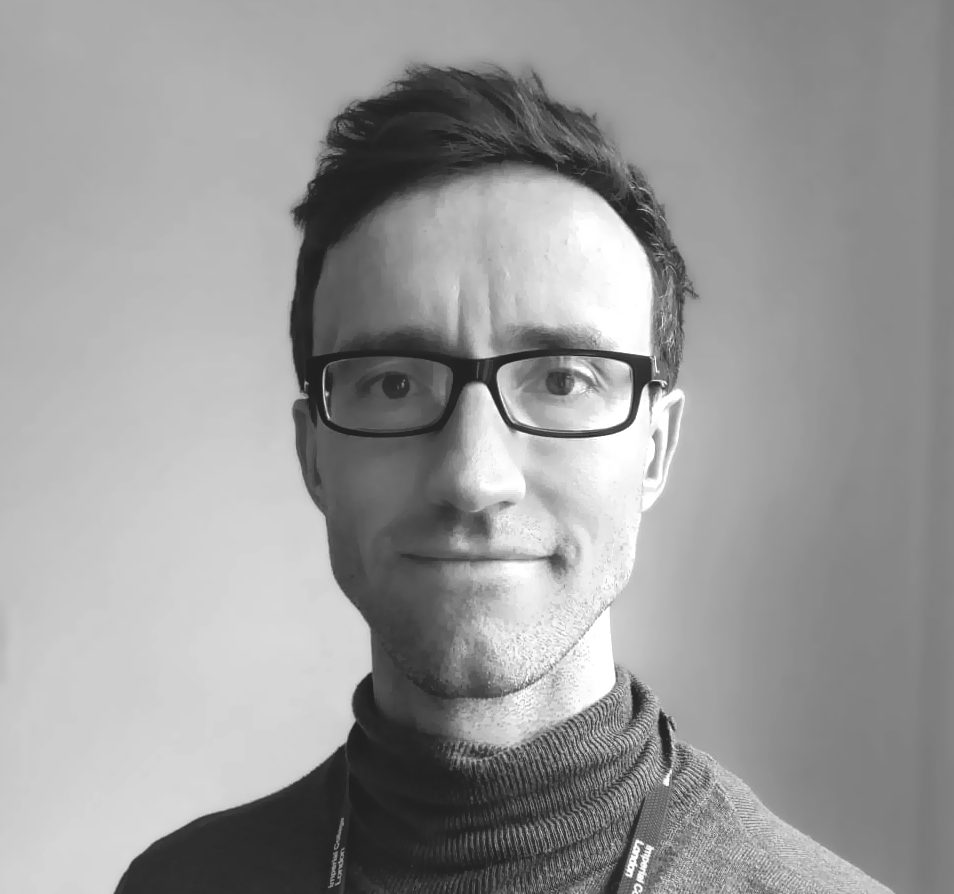
As part of our in profile series, we spoke to Gregory Scott, Post-doctoral Post-CCT Research Fellow (IPPRF). Here, he tells us more about what inspired him to pursue neuroscience and his recently awarded NIHR Advanced Fellowship.
Introduce yourself – who are you and what do you do?
I’m Dr Greg Scott. I am a PI in the Department of Brain Sciences and I’m an honorary consultant neurologist at the Trust. My current post is an Imperial Post-doctoral Post-CCT Research Fellowship (IPPRF). I’ve also recently been made a Group Leader in the UK Dementia Research Institute Care Research & Technology centre, at the White City Campus.
Tell us about your career so far – when did you join the college, and where were you working/studying before this?
I first studied Computing (BEng) at Imperial, in 1999. During my first year, my life changed when I had epileptic seizures and was diagnosed with a temporal lobe brain tumour. This was resected during an awake craniotomy at Charing Cross Hospital in March 2000. At the time this felt like simultaneously the most barbaric and sophisticated thing to do to someone.
The whole experience was an intellectual awakening, and I became fascinated by neurology and neuroscience. I resolved to study Medicine. I did Chemistry A-level (required for Medicine) in evening classes while doing a research Masters (MSc Advanced Computing). I then did the MBBS course at Imperial and graduated in 2008. Ever since, I’ve mixed my clinical work and research, doing an academic clinical fellowship, a PhD, and then an NIHR Clinical Lectureship. I finished my neurology training in February 2022. I’ve recently written about my experience for the Practical Neurology journal.
Can you explain a bit more about your research interests and what initially sparked your interest in your current field?
I think my computational background gives me quite a unique perspective on neurology and neuroscience, and my research interests are at the intersection of these things. I’m particularly interested in abnormal states of consciousness, and how we can use tools from information theory and machine learning to measure the brain activity linked to these states, and eventually produce a clinically useful device to use on the patient in front of me.
You recently started an NIHR Advanced Fellowship project – what will this research be about?
The five-year fellowship funds a study to develop better measures of brain state in hospitalised patients by combining simple electroencephalography (EEG) hardware and machine learning. Clinical EEG at the moment is often a poorly accessible and quite mysterious tool for many clinicians. There is a range of easy-to-use EEG hardware nowadays. To my mind, the challenge is how to turn EEG signals into clinically useful metrics that we can use widely.
The fellowship focus is patients with delirium – an acute disturbance of consciousness. This is a prevalent yet poorly understood condition that is not only bad for your brain, but clinically we are surprisingly poor at detecting and measuring it. I want to improve on that situation. I also currently have a job advert for a post-doc on the fellowship.
What aspect of your role are you most excited about?
I love my job. I feel very fortunate to be in a position where I can be the master of my own destiny in a way that most jobs don’t afford, although it comes with a lot of stresses and a want to do justice to the opportunity I’ve been given. I am able to mix thinking, analysis, writing, patient contact, supervision, and leadership, which is very fulfilling. In the end I want to bring about discoveries, devices, and treatments that have a real-world effect.
When you are not working, what are your main passions and hobbies?
I am passionate about creativity and originality, about not being just a consumer, but thinking differently and putting stuff out into the world. I have three wonderful children, who are grounding and inspiring, and I hope I imbue this sense in them. I enjoy doing creative projects with them. We make short films. I am trying to teach them programming. I am slightly obsessed with song writing.
And finally – if you were stranded on a desert island but allowed one luxury item, what would it be?
I would say I’d take my kids, but luxury is not the right adjective. I pretty unashamedly would take my laptop (provided it had an internet connection), because it subsumes a lot of other choices, and it affords a pretty limitless world of opportunity, learning, and productivity. And it might keep my students happy.